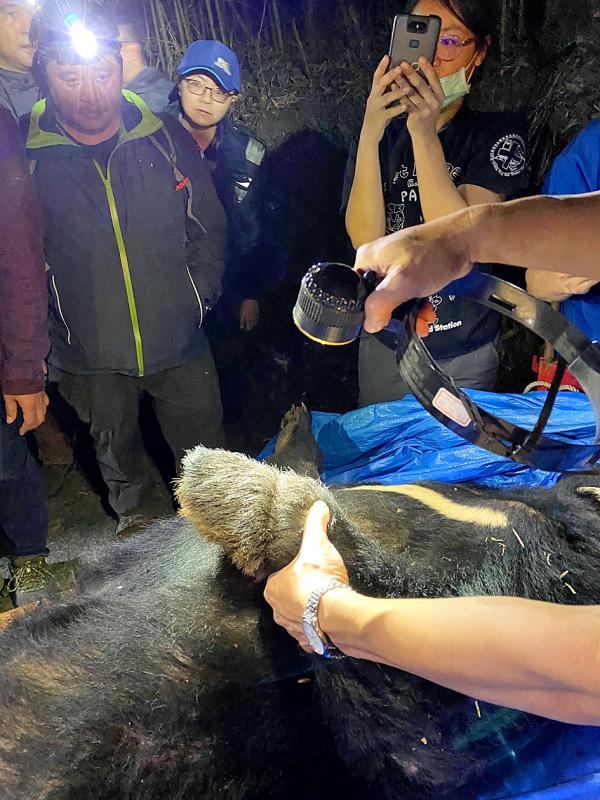The government should help people manage risks posed by wild animals, bear expert Hwang Mei-hsiu (黃美秀) said yesterday, after a Formosan black bear was caught in a trap twice in less than two months, possibly the fourth time it has been trapped.
In October last year, the bear, later codenamed No. 711, was rescued from a trap by the Dongshih Forest District Office. It was treated, fitted with a tracker and released to the wild on Taichung’s Dongmao Mountain (東卯山) on Dec. 3.
However, the office on Saturday found via the tracker that the bear had not moved since the night before and sent a team to investigate.

Photo courtesy of Dongshih Forest District Office
The team found the bear caught in a trap in a bamboo grove and sent it back to the Endemic Species Research Institute Low Altitude Experimental Station in Taichung for treatment and relocation.
Based on the animal’s scars, it was likely the fourth time it has been caught in a trap meant to ensnare macaques or wild boars, Hwang said on Facebook.
Some people believe that bears should not enter the low-elevation mountains in Taichung, as it is densely populated, but it is actually farmland interspersed with forest that is 1km above sea level, she said, adding that based on No. 711’s activity, the bear spends most of its time in uninhabited areas.
Formosan black bears require a broad territory without much human interference, she said.
Since bears are highly intelligent opportunists, the best way to prevent them from becoming a nuisance is to stop giving them positive reinforcement in the form of food, she said.
Hwang recommended that the office “use satellite positioning during the day to devise a strategy and deploy a team, clear human food from the area, and after nightfall hold the line and step up intermittent harassment.”
Authorities must look out for potential hazards to wildlife, as well as assist the public in dealing with potential damage wrought by wild animals to make sure that traps targeting other animals, such as macaques or wild boars, do not accidentally ensnare black bears, she added.
Based on her correspondence with older residents of Taoyuan’s Taoshan Village (桃山), where bear No. 711 had been stealing food, Hwang said that people are relatively tolerant of black bears.
However, some people are afraid of them and lack sufficient knowledge, so without education about how to manage the threat, residents have failed to notify authorities or take appropriate measures, such as clearing food or pruning vegetation around farmland, to prevent black bear encroachment, she said.
“This is likely the first case of human-bear conflict that has gained considerable attention from people, conservation groups and the media,” Hwang said. “I hope the authorities will communicate with the public in a professional, wise and patient manner to create a beneficial balance between humans and bears, and establish a model for Formosan black bear conservation.”
“This place is our traditional land, but it is also the black bears’ traditional land,’” Hwang quoted a resident as saying. “This understanding is the precondition for living and thriving together.”

An essay competition jointly organized by a local writing society and a publisher affiliated with the Chinese Communist Party (CCP) might have contravened the Act Governing Relations Between the People of the Taiwan Area and the Mainland Area (臺灣地區與大陸地區人民關係條例), the Mainland Affairs Council (MAC) said on Thursday. “In this case, the partner organization is clearly an agency under the CCP’s Fujian Provincial Committee,” MAC Deputy Minister and spokesperson Liang Wen-chieh (梁文傑) said at a news briefing in Taipei. “It also involves bringing Taiwanese students to China with all-expenses-paid arrangements to attend award ceremonies and camps,” Liang said. Those two “characteristics” are typically sufficient

A magnitude 5.9 earthquake that struck about 33km off the coast of Hualien City was the "main shock" in a series of quakes in the area, with aftershocks expected over the next three days, the Central Weather Administration (CWA) said yesterday. Prior to the magnitude 5.9 quake shaking most of Taiwan at 6:53pm yesterday, six other earthquakes stronger than a magnitude of 4, starting with a magnitude 5.5 quake at 6:09pm, occurred in the area. CWA Seismological Center Director Wu Chien-fu (吳健富) confirmed that the quakes were all part of the same series and that the magnitude 5.5 temblor was

The brilliant blue waters, thick foliage and bucolic atmosphere on this seemingly idyllic archipelago deep in the Pacific Ocean belie the key role it now plays in a titanic geopolitical struggle. Palau is again on the front line as China, and the US and its allies prepare their forces in an intensifying contest for control over the Asia-Pacific region. The democratic nation of just 17,000 people hosts US-controlled airstrips and soon-to-be-completed radar installations that the US military describes as “critical” to monitoring vast swathes of water and airspace. It is also a key piece of the second island chain, a string of

The Central Weather Administration has issued a heat alert for southeastern Taiwan, warning of temperatures as high as 36°C today, while alerting some coastal areas of strong winds later in the day. Kaohsiung’s Neimen District (內門) and Pingtung County’s Neipu Township (內埔) are under an orange heat alert, which warns of temperatures as high as 36°C for three consecutive days, the CWA said, citing southwest winds. The heat would also extend to Tainan’s Nansi (楠西) and Yujing (玉井) districts, as well as Pingtung’s Gaoshu (高樹), Yanpu (鹽埔) and Majia (瑪家) townships, it said, forecasting highs of up to 36°C in those areas